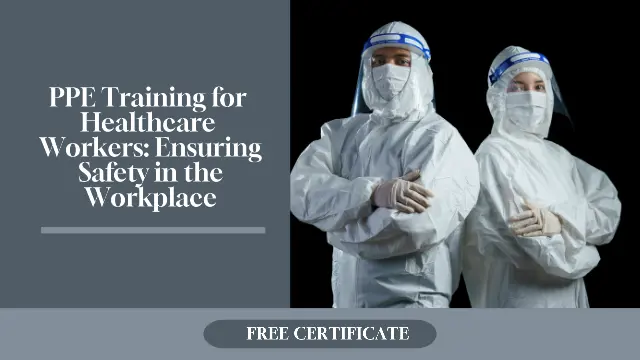
PPE Training for Healthcare Workers: Ensuring Safety in the Workplace
Interactive Video Lessons | Free E-Certificate | Tutor Support
METAVERSESKILLS
Summary
- Certification of Completion - Free
- Tutor is available to students
Add to basket or enquire
Overview
A career as an Infection Prevention and Control Specialist involves working in healthcare settings to prevent and control the spread of infectious diseases. These professionals play a critical role in ensuring the safety of patients, healthcare workers, and the community. Infection Prevention and Control Specialists are responsible for developing and implementing strategies to minimize the risk of infections, including the proper use of personal protective equipment (PPE). They work closely with healthcare teams, provide training and education, conduct assessments, and monitor compliance with infection control protocols.
Certificates
Certification of Completion
Digital certificate - Included
Description
Module 1: Introduction to Personal Protective Equipment (PPE)
- Understanding the importance of PPE in healthcare settings
- Different types of PPE and their uses
- Proper selection and fitting of PPE
Module 2: Infection Prevention and Control
- Principles of infection prevention and control
- Transmission-based precautions and their implications
- Hand hygiene and proper glove usage
Module 3: Respiratory Protection
- Types of respiratory hazards in healthcare settings
- Proper use of N95 respirators and other respiratory protective equipment
- Fit testing and seal checks
Module 4: Protective Clothing and Equipment
- Use of gowns, coveralls, and aprons
- Understanding the limitations and proper disposal of single-use PPE
- Cleaning and decontamination of reusable PPE
Module 5: Eye and Face Protection
- Importance of eye protection in preventing exposure to infectious agents
- Selection and use of goggles, face shields, and other protective eyewear
- Cleaning and maintenance of eye and face protection
Module 6: Hand and Foot Protection
- Importance of hand hygiene and proper glove usage
- Types of gloves and their appropriate uses
- Foot protection and the use of safety footwear
Module 7: PPE Donning and Doffing Procedures
- Step-by-step instructions for donning and doffing PPE
- Sequence and techniques to minimize the risk of contamination
- Safe disposal of PPE
Module 8: PPE Maintenance and Storage
- Proper storage and maintenance of PPE
- Inspection and replacement guidelines
- Documentation and record-keeping
Who is this course for?
- Developing and implementing infection prevention and control policies and procedures.
- Providing training and education on PPE usage and infection control practices.
- Conducting risk assessments and monitoring compliance with infection control protocols.
- Investigating and managing outbreaks or incidents of healthcare-associated infections.
- Collaborating with healthcare teams to develop strategies for preventing infections.
- Ensuring compliance with relevant regulations and guidelines.
- Monitoring and evaluating the effectiveness of infection control measures.
- Staying updated with emerging infectious diseases and best practices in infection prevention.
Requirements
No prior knowledge or experience required
Career path
- In-depth knowledge of infection prevention and control principles and practices.
- Familiarity with relevant regulations, guidelines, and standards.
- Strong understanding of personal protective equipment (PPE) and its proper use.
- Excellent communication and training skills.
- Analytical and problem-solving abilities
Questions and answers
Currently there are no Q&As for this course. Be the first to ask a question.
Reviews
Currently there are no reviews for this course. Be the first to leave a review.
Legal information
This course is advertised on reed.co.uk by the Course Provider, whose terms and conditions apply. Purchases are made directly from the Course Provider, and as such, content and materials are supplied by the Course Provider directly. Reed is acting as agent and not reseller in relation to this course. Reed's only responsibility is to facilitate your payment for the course. It is your responsibility to review and agree to the Course Provider's terms and conditions and satisfy yourself as to the suitability of the course you intend to purchase. Reed will not have any responsibility for the content of the course and/or associated materials.


